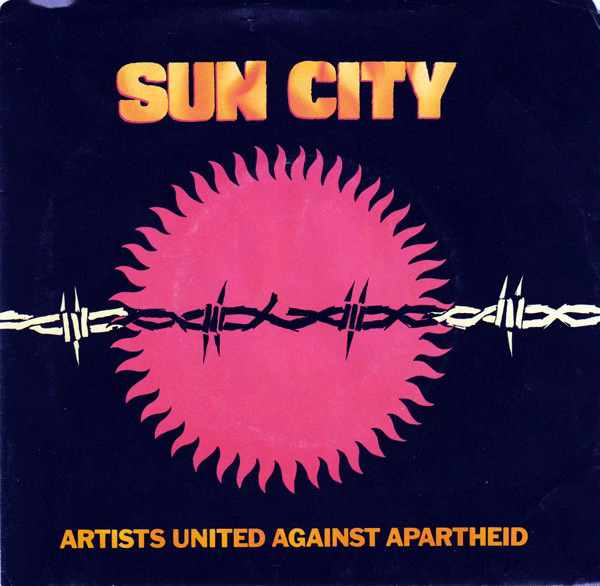The 1985 Project Part 5: Artists United Against Apartheid - Sun City
Or how I learned something of what was going on in the world
Artists United Against Apartheid – Sun City
Back in those days, we didn’t hear much about the horrors of apartheid in South Africa. I think I first heard about it in 1984, when the Special AKA released “Free Nelson Mandela,” and reviews of the record told me this man had been a freedom fighter in his country, and had been in prison since 1961. Somewhere in there, I learned that “Biko” by Peter Gabriel was about the same struggle, only more recently. But it was the music press writing about this Artists United Against Apartheid record that really opened my eyes to the situation. It was obvious to me right away that the United States was on the wrong side of history here, and that the government of South Africa needed to fall so that all the people in that nation could live freely.
When Chuck D. a few years later said that rap music was like “CNN for young people,” he was already talking about a time when 24 hour news channels were something everybody understood. In 1985, cable TV had very little market penetration, and the news came in daily papers and half hour installments on television. There were places I could have gone to find more background and analysis, but I didn’t know about them yet. So, it was this record and its press coverage that pushed me even further to the left than I had already been pushed.
The single “Sun City” was a major deal “We’re rockers and rappers united and strong” is the first line, rapped in unison by Afrika Bambaata, Kurtis Blow, and many other hip hop stars. The song was obviously modeled after the Band Aid and USA for Africa projects, but these performers were not all superstars. Putting Bob Dylan, Herbie Hancock, the Fat Boys, Joey Ramone, David Ruffin, Lou Reed, Run-DMC, Bonnie Raitt, Big Youth, and dozens of others on the same record impressed those of us more attuned to the lower rungs of the pop music ladder. Mixing hip hop, just beginning to be recognized as a major art form and not a novelty, and rock was a breakthrough in our own country, where music was still very segregated. Even today, when I can’t immediately recognize all the voice anymore, the enthusiasm, activist energy, and camaraderie in a jut cause spills from the recording. Arthur Baker’s gigantic drum beats and Steven Van Zandt’s indelible catch phrase “I ain’t gonna play Sun City” holds a thrill just on a musical level.
The rest of the album is mostly quite good, too. Peter Gabriel and Shankar (not Ravi Shankar, but the one who I think was also known as L. Shankar) made a cool beat-heavy improvisation on some South African sounding melody and called it “No More Apartheid.” Keith Leblanc, just beginning to be known, put together an aural college of sound-clips from South Africa, and laid down a gigantic drum beat to mix it with – this was possibly as early an example of this sort of thing as I ever heard. Gil Scott-Heron leads a host of young rappers in a powerful number called “Let Me See Your I.D.” which dares to compare U.S. policies towards African-Americans with South African apartheid. And Miles Davis plays some lovely trumpet on the instrumental “The Struggle Continues.” Only Bono – of course – embarrasses himself by completely misunderstanding how to sing blues-influenced music, coming off as a third rate Nick Cave imitator with “Silver and Gold” which has at least, some nice Keith Richards and Ron Wood guitar as compensation. I honestly didn’t remember this cut until relistening today for the first time in decades.
While this record is artistically enjoyable and morally vibrant, I can’t really understand how it placed as high as number 5 in the Pazz and Jop Poll that year. I think it was placed on a lot of ballots more or less as a show of solidarity to the cause. It played a major role in my life, and probably in the lives of many other people, but it hasn’t been something I’ve thought about in a long, long time. I’m glad I played it one more time, but may not hear it again.
I’d say 7.5 out of 10 is a very solid grade for a very solid record.




To this day, whenever anyone invokes Nelson Mandela, I sing the hook in my head: "FREEEEEEEEE, Nelson Mandela!" There were major antiapartheid protests taking place at Wash U when I was an undergraduate. Unlike the more recent protests, they did not accuse the students of trespassing and vandalism, and the students weren't expelled. It would appear that some apartheid-practicing ethnostates are more acceptable than others.